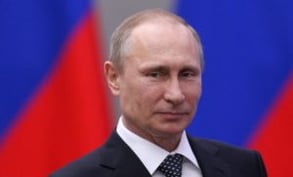![]()

Vladimir Putin, President of Russia, acts in spite of UN sanctions and a falling economy.
Russia’s economy is currently declining due to the decrease in oil prices and increase in sanctions.
Moscow, Russia’s capital, has become so dependent on energy sales that for each dollar the price of oil falls, Russia loses approximately $2 billion in potential sales, according to Time, a national and world news platform.
According to Randall Waldron, professor of economics and international business, Russia’s problem is structural.
“U.S based companies and other multi-nationals have tried to do business in Russia. Wal-Mart tried. They bailed out of the market. They found that they simply couldn’t work there because of corruption and market structure problems. So until Russia gets serious about addressing some of these issues there is probably not a lot of potential,” Waldron said.
In February 2014, unidentified gunmen took over several government buildings in Crimea, formerly a Ukrainian territory. Vladimir Putin, the president of the Russian Federation, officially annexed Crimea a few weeks after the gunmen, who were Russian, invaded the peninsular. Leaders from the U.S. and other western countries criticized Russia’s actions by placing sanctions on Russia.
Benjamin Goossen, sophomore graphic design major, lived in neighboring Kyrgyzstan. He stated that the solution to Russia’s problems might be to get a new president. “I feel like Putin is not a good leader for the country and he doesn’t necessarily have the country’s best interest in mind. He wants power and he wants control,” Goossen said.
As a result of economic decline, Russia’s level of expenditure has increased, creating a large deficit in the country’s budget. Russia now mainly depends on its reserve fund for survival.
Russia had $87 billion in its reserve fund at the start of 2014, but with the country’s current rate of spending, the reserve fund may run out around 2017, according to Reuters, an international news agency.
The ruble, Russia’s unit of currency, lost 40 percent of its value in 2014 and by December 2015, it was 20 percent down compared to 2014, according to U.S. News.
KayLynn Havens, freshman nursing major, grew up in Krasnodar, a city in Russia, and was affected by the declining value of the ruble. When Havens was in high school, she and her classmates were fundraising for a senior trip but because of the country’s economic inflation, they were not very successful.
“We had to actually pay a lot of money out of pocket because we didn’t make enough money from the fundraisers,” Havens said.
Russia increased its interest rates from 10.5 percent to 17 percent to encourage people to keep their money in rubles.
This lasted only for a few hours, as the ruble continued to lose its value. It went down 19 percent in only 24 hours, according to Bloomberg, a global news source.
Abby Acker, junior engineering major, grew up in Kazakhstan, which is south of Russia. She believes that Russia needs more consistent development.
“There are ways for rich people to make money but there’s not really ways for people who are in poverty to get out of that. There aren’t a lot of jobs that you would find middle class people having,” Acker said.
Russia continues to strive for economic growth in the midst of commercial setbacks.




